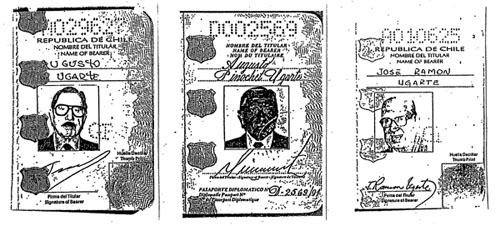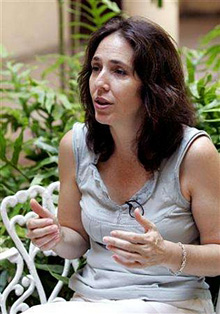 Raul Castro, alongside Evo Morales, (Haiti's) Rene Preval and Daniel Ortega
Raul Castro, alongside Evo Morales, (Haiti's) Rene Preval and Daniel Ortega
So today's big festivities in Cuba (Fidel's delayed 80th BDay and 50th Anniversary of the Revolution's start) went off without a hitch and without Fidel. Pundits (mostly in the US) are declaring "the end of the Fidel era" But whether Fidel's absence is symbolic or just his doctor's showing caution, it is becoming increasingly clear that the physical Fidel is not as important as his ideas.
As Cuban Foreign Minister Felipe Pérez Roque said during the week: "The enemies of the Cuban revolution are counting the minutes waiting and hoping that he dies, without understanding that Fidel no longer is Fidel. Now, he is the people, and he is every man and woman prepared to fight for the idea that a better world is possible.”
But it is true that Fidel would have done anything to be there today. His absence is a serious phycological shock to the Cuban people, who roared loudest whenever 'Viva Fidel' was shouted during the day.
The other big Cuba news coming out of today is the repeated offer by acting President Raul Castro to negotiate with the United States to normalize relations, provided the US respects Cuba's independence. Though this has been Cuba's policy for 47 years, the fact Raul has said it twice now, in his 2 major speeches since Fidel got ill, seems to signal something stronger. It seems the US media is taking note.

Below is a portion of Raul's speech From Revolution Square at today's 50th Anniversary celebration of the Cuban Revolution:We are experiencing an exceptional moment in history.
Many thought that the demise of the socialist block and the collapse of the Soviet Union would spell the end for the international revolutionary movement.
Some even suggested that we abandon the ideals to which entire generations of Cubans had dedicated their lives, while over the last few years the US government, in the opportunistic manner characteristic of them, have stepped up their hostility and aggressiveness against Cuba to an unprecedented high, in the hope of economically suffocating the country and overthrowing the revolution by intensifying their subversive acts.
In this regard, the surprise and frustration of our enemies was great, and the admiration of the oppressed masses even greater, when they witnessed the perseverance, equanimity, maturity and self-confidence that our people have shown over these last four months.
Despite the manoeuvres and pressure of the United States and its allies, the prestige enjoyed by Cuba around the world has strengthened.
An example of this was the 14th Non-Aligned Summit successfully held in our capital last September, and more recently the unprecedented support given in the United Nations General Assembly to the resolution condemning the US blockade on our country.
In Latin America, the application the neo-liberal formula imposed by the United States and their European buddies has led the continent into the sad situation of being the region in the planet where the opulence of the oligarchy with close links to foreign capital is the most insulting and obnoxious when compared to the poverty, insalubrities and ignorance in which the majority of the population lives.
Over recent years, the peoples of Latin America have been progressively expressing their feelings of indignation and repudiation towards the treacherous and submissive policies adopted by traditional governments and parties.
Popular and revolutionary movements are getting stronger and despite Washington's multimillion-dollar campaigns of disinformation, the blackmail and brazen interference, new and experienced leaders are assuming the leadership of their nations.
The attempt by the United States to economically annex Latin America by way of the FTAA was thwarted while a project of integration known as the Bolivarian Alternative for the Americas, Alba, is taking its place following a proposal by president and brother, Hugo Chavez, to benefit the dispossessed masses.
Recent events in the international arena bear witness to the failure of the adventurous policies of the current US administration. On 7 November, the people of that country showed by the ballot box their rejection of the strategic concept of pre-emptive war, the use of lies to justify military interventions, kidnappings and secret prisons, and the despicable legalisation of torture in the so-called war on terrorism.
Three years and seven months after President Bush euphorically and precipitately declared on board an aircraft carrier "mission accomplished" with regards to the war in Iraq, the bodies of young American soldiers killed in a war spurred by the desire to control the region's energy resources continue to be sent back to the United States.
Nobody dares anymore to predict when it will end.
The US government is at a dead-end: on the one hand, it realises that it cannot prolong occupation in Iraq, while on the other it admits that it doesn't have the minimum conditions needed to pull out without damaging their interests.
Meanwhile, the number of deaths and mutilations continues to mount among civilians subjected to an internecine war, the result of the anarchy and chaos created by the US invasion.
Some in the United States are now suggesting that they simply withdraw from the chaos that they themselves created.
We don't know what they will do in this case, with the Nato left high and dry by its American buddies in the conflict in Afghanistan, which is also becoming increasingly unmanageable and dangerous.
In the eyes of the world, the so-called "crusade on terrorism" is unavoidably heading down the path to a humiliating defeat.
The American people, just as in the case of Vietnam, will put an end to these unjust and criminal wars.
We hope that the US authorities will learn that war is not the solution to the growing problems afflicting the planet; that proclaiming their right to irresponsibly attack "60 or more dark corners" of the world, even when they are already stuck in two of them, makes their differences with other countries more complex and profound; that power based on intimidation and terror will never be anything more than a passing illusion and that the terrible consequences of this on the peoples of the world, including the American, are clear to see.
We feel certain that the way to resolve the pressing conflicts afflicting mankind is not through war, but rather political solutions.
We take this opportunity to once again state that we are willing to resolve at the negotiating table the longstanding dispute between the United States and Cuba, of course, provided they accept, as we have previously said, our condition as a country that will not tolerate any blemishes on its independence, and as long as said resolution is based on the principles of equality, reciprocity, non-interference and mutual respect.
In the meantime, after almost half a century, we are willing to wait patiently until the moment when common sense prevails in the Washington power circles.


















